Digital Transformation Platform Guide: Features & Tools [2026]
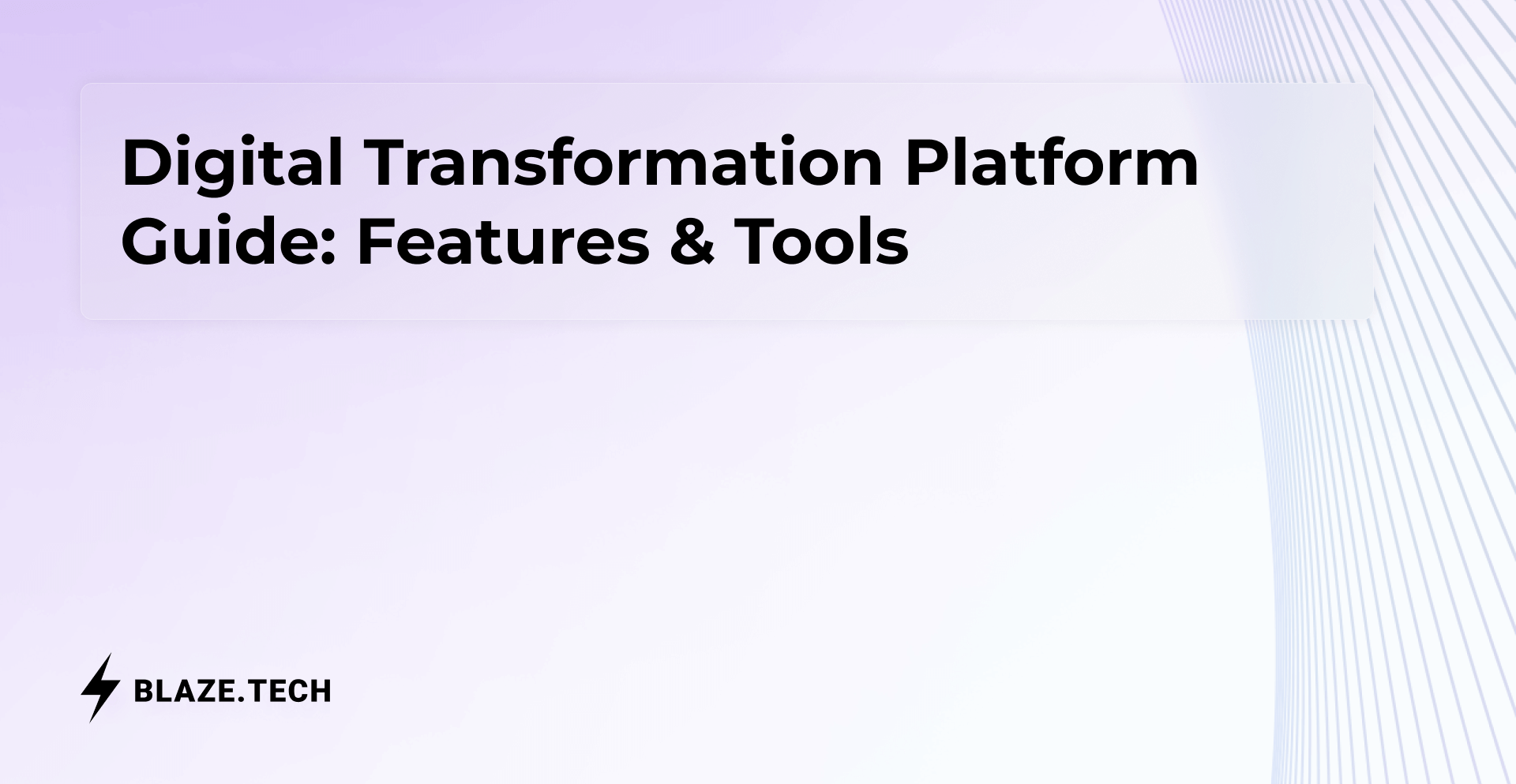
Tired of slow-moving processes and outdated software slowing your team down? A digital transformation platform can help you modernize operations, automate manual tasks, and integrate your disparate systems — without requiring developers.
These platforms save time by integrating third-party apps like CRMs or ERPs and letting teams build internal tools when needed. For instance, use Blaze to create nearly any tool, Salesforce for custom CRM, and Acceldata for tailored data insights. Read on to learn more about:
- What digital transformation platforms are, and their use cases
- Core capabilities of a high-quality digital transformation platform
- How to select the right one for your business
- An overview of 4 digital transformation platforms
- Why a growing number of businesses are opting for one particular platform
Let’s now talk about what a digital transformation platform is.
What Is a Digital Transformation Platform?
A digital transformation platform is a centralized software solution that helps modernize and coordinate enterprise operations. It replaces outdated, manual systems by integrating third-party applications and workflows. This enables you to automate tasks and connect fragmented data sources.
Digital automation platforms drive digital transformation by enabling cloud migration, scaling operations, and aligning IT with business goals. Teams use digital transformation software to automate onboarding, unify data pipelines, and build secure cloud-native infrastructure.
Core Capabilities to Look For
Look for platforms that support customizable workflows, enterprise-grade security, and integrations with applications you already use. Focus on capabilities that solve real operational challenges and reduce dependence on manual processes. Here are the capabilities that a high-impact digital business transformation platform will offer:
- Flexibility: Adopt a platform that supports no-code app development and integrations with your existing software stack. This flexibility enables your team to develop internal tools, like project management boards or scheduling platforms. No-code platforms allow teams to build and iterate quickly, without waiting on developers.
- Compliance and security: Check for enterprise-grade security features like data encryption, role-based access controls, and audit logs. If you’re storing client data, you’ll need SOC 2 compliance. Healthcare organizations handling patient data must use a HIPAA-compliant platform.
- Scalable architecture: If you’re looking for a cloud transformation platform, it should offer a modular, service-oriented enterprise application architecture for painless scaling. Those aiming for an on-prem solution should consider platforms offering hybrid options for full data control without sacrificing flexibility.
Digital transformation software helps your team work faster, stay compliant, and build tools focused on your actual needs. It should enable you to automate manual processes and launch new tools quickly and easily.
How to Choose the Right Platform for Your Business
Choosing the right digital business transformation platform means knowing your bottlenecks and what a digital transformation app can do. Before selecting a digital transformation app or software, ask the following:
What Are the Processes or Workflows You’re Aiming to Transform?
Choose platforms with hybrid options if your organization needs an on-prem solution for full control and flexibility. Reconfigure your systems when you manually approve decisions, slog through apps, or repeat the same tasks. Pinpoint weak workflows so you can focus on the right automation and integration tools.
Are You Looking to Replace Outdated Tools or Build Custom Solutions?
If you’re still using outdated, legacy software, a complete system overhaul may be your best option. However, if you only need to create customized tools that work alongside your current platform, a no-code solution may be the better fit. In that case, selecting a platform like Blaze could be your best option.
How Technically Savvy Is Your Team?
Full-code platforms require experienced developers, and low-code platforms require technical expertise. This means both options are off the table if your team lacks technical depth. No-code platforms are a viable option for non-technical teams. They offer premade templates and components and a drag-and-drop editor, so nearly anyone can use them.
4 Platforms Leading the Digital Transformation Market in 2025
- Blaze: Best for Custom Internal Platforms
- Salesforce: Best for Multi-Tool Transformation
- Acceldata: Best for Enterprise Data Operations
- Appian: Best for Technical Teams
1. Blaze: Best for Custom Internal Platforms
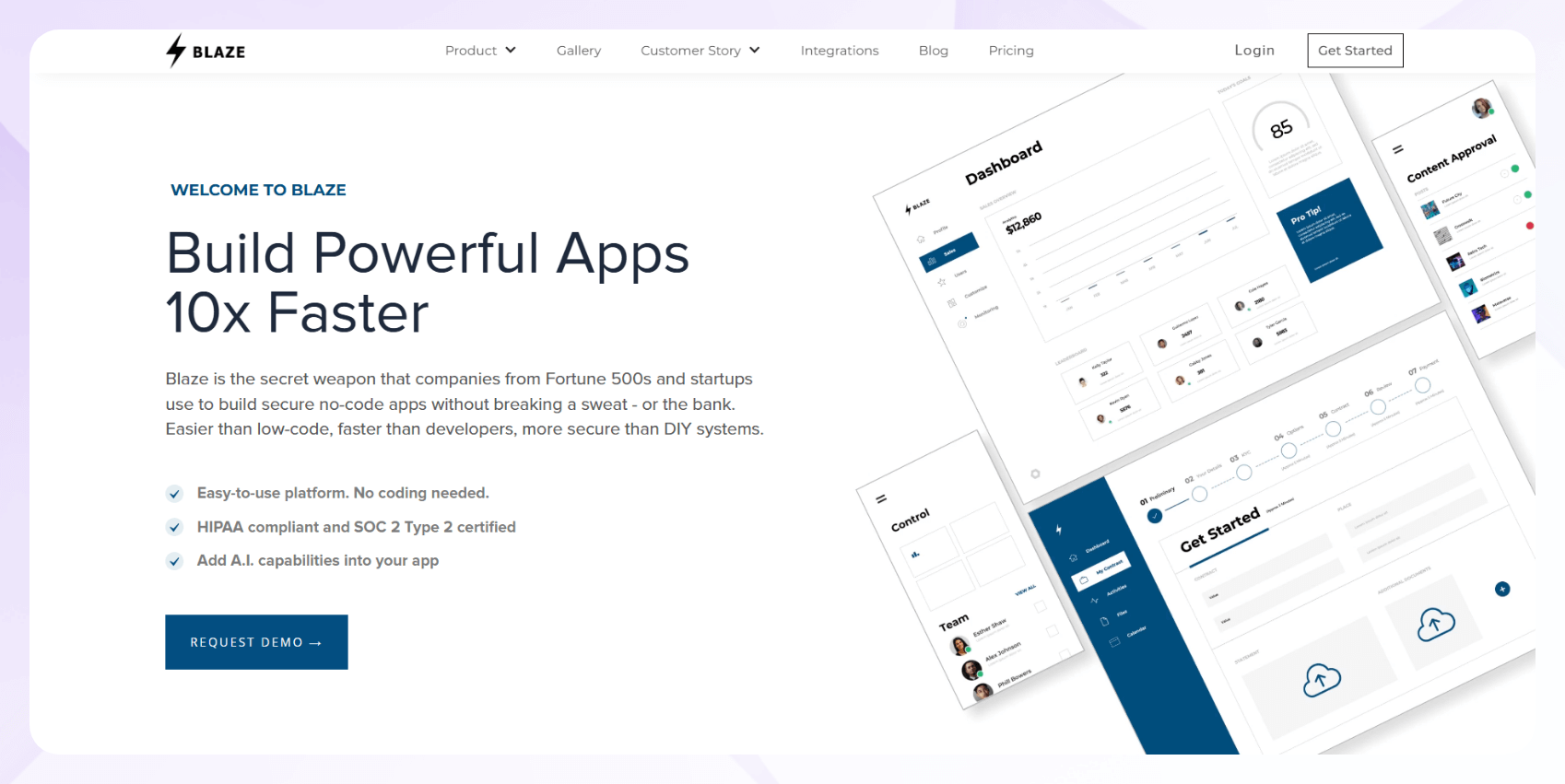
Blaze lets users build complex, customized apps without needing engineers or coding skills. The platform secures data and enables rapid deployment.
Who It’s for
The platform caters to medium-sized teams and above. Blaze’s capabilities extend to companies in industries like healthcare, finance, supply chain, and e-commerce. Due to its no-code simplicity, Blaze is designed for non-technical teams that want to create their own customized solutions without writing any code.
Pricing
Start using Blaze at $1,350/month and build an unlimited number of apps with unlimited storage. For HIPAA and SOC-2 compliance, contact the Blaze team for a demo.
Key Capabilities
- No-code components: Blaze offers a simple drag-and-drop interface and pre-made components, such as forms, calendars, and buttons. You’ll also be able to build your databases with Blaze’s no-code database builder. This means you can develop your app without any technical knowledge.
- Integrations: Connect your Blaze-made apps to third-party platforms like Stripe, QuickBooks, and others. If you use a lesser-known software, you’ll still be able to transfer data and set up automations with Blaze’s REST API.
- Security: Blaze offers security features like end-to-end encryption, multi-factor authentication, and HIPAA and SOC 2 compliance.
Why It Matters
We created Blaze to offer secure, cloud-based no-code development. It manages sensitive data by enforcing strict access controls. When you onboard, Blaze will deploy its customer success team, so you know how to use the platform before you begin your build.
2. Salesforce: Best for Multi-Tool Transformation
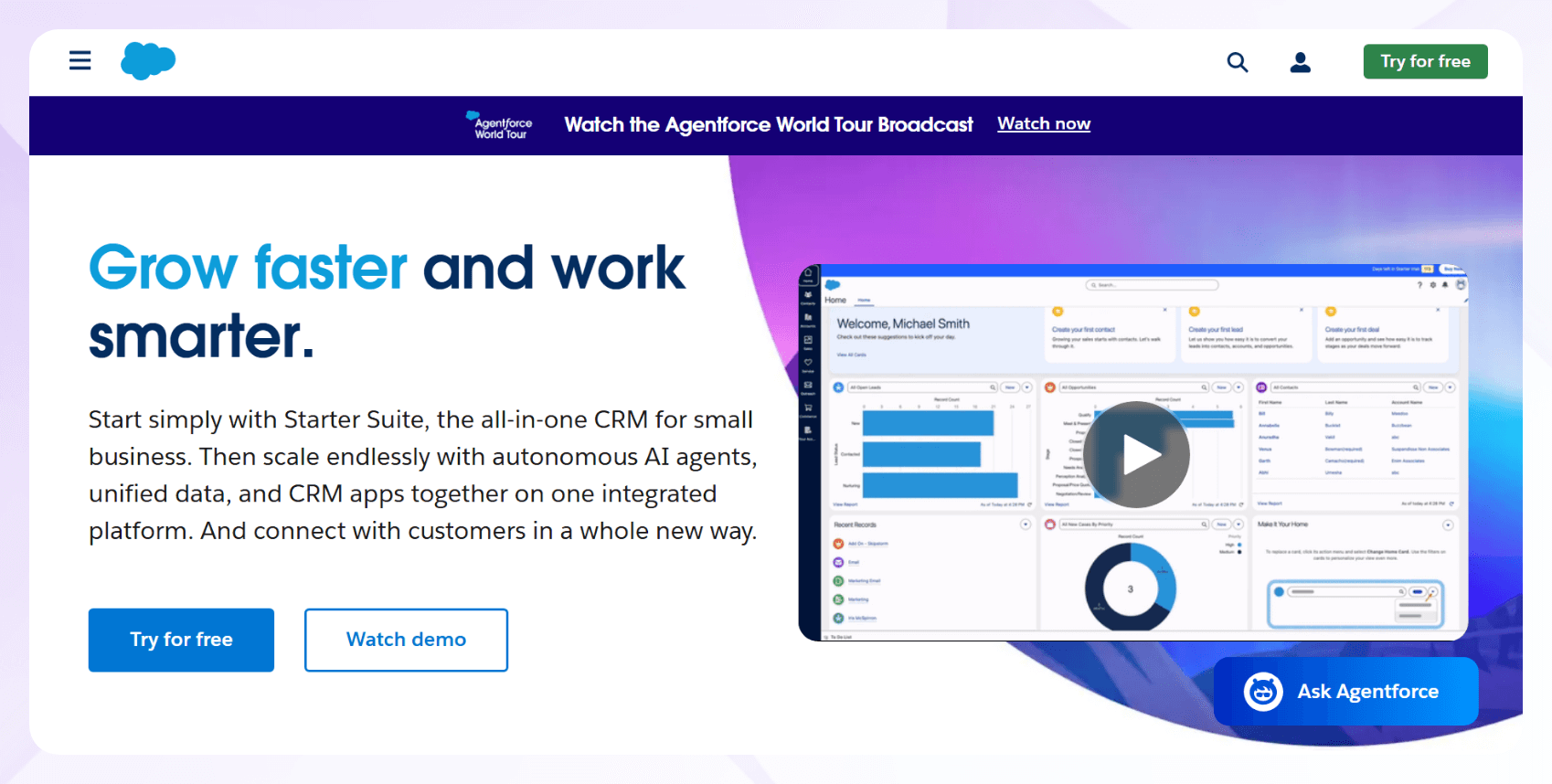
Salesforce is a digital transformation platform best known for its CRM, but its Platform as a Service (PaaS) goes beyond that. Its vast toolbox of data products, CRM suite, and automations make Salesforce a viable option for any organization seeking a digital transformation platform.
Who It’s for
Salesforce meets the needs of sales, marketing, and customer service teams in mid-size to large businesses. If you're already using Salesforce CRM, you can extend its capabilities with tools like its AI agents or low-code app builder for more tailored applications.
Pricing
Salesforce pricing depends on the application you purchase. CRM pricing starts at $25/month per user, while Agent Force starts at $500/100,000 credits. Credit usage depends on the complexity of your automations.
Key Capabilities
- Several tools in one platform: Beyond its classic Salesforce CRM, the platform gives you the option to choose more than one digital transformation app. For instance, you can build AI agents, create e-commerce stores, track your analytics, and more.
- AI agent builder: Build AI agents that can help qualify leads, assist with making deals, and execute customer service tasks via AI chatbot embedded on your website.
- Low-code app builder: If your team has programming knowledge, they can develop custom applications, such as deal trackers and product pages.
Why It Matters
Salesforce provides integrated tools for driving informed decisions and customizable features. Its AI agents can offload manual tasks and surface actionable insights without increasing your headcount.
3. Acceldata: Best for Enterprise Data Operations
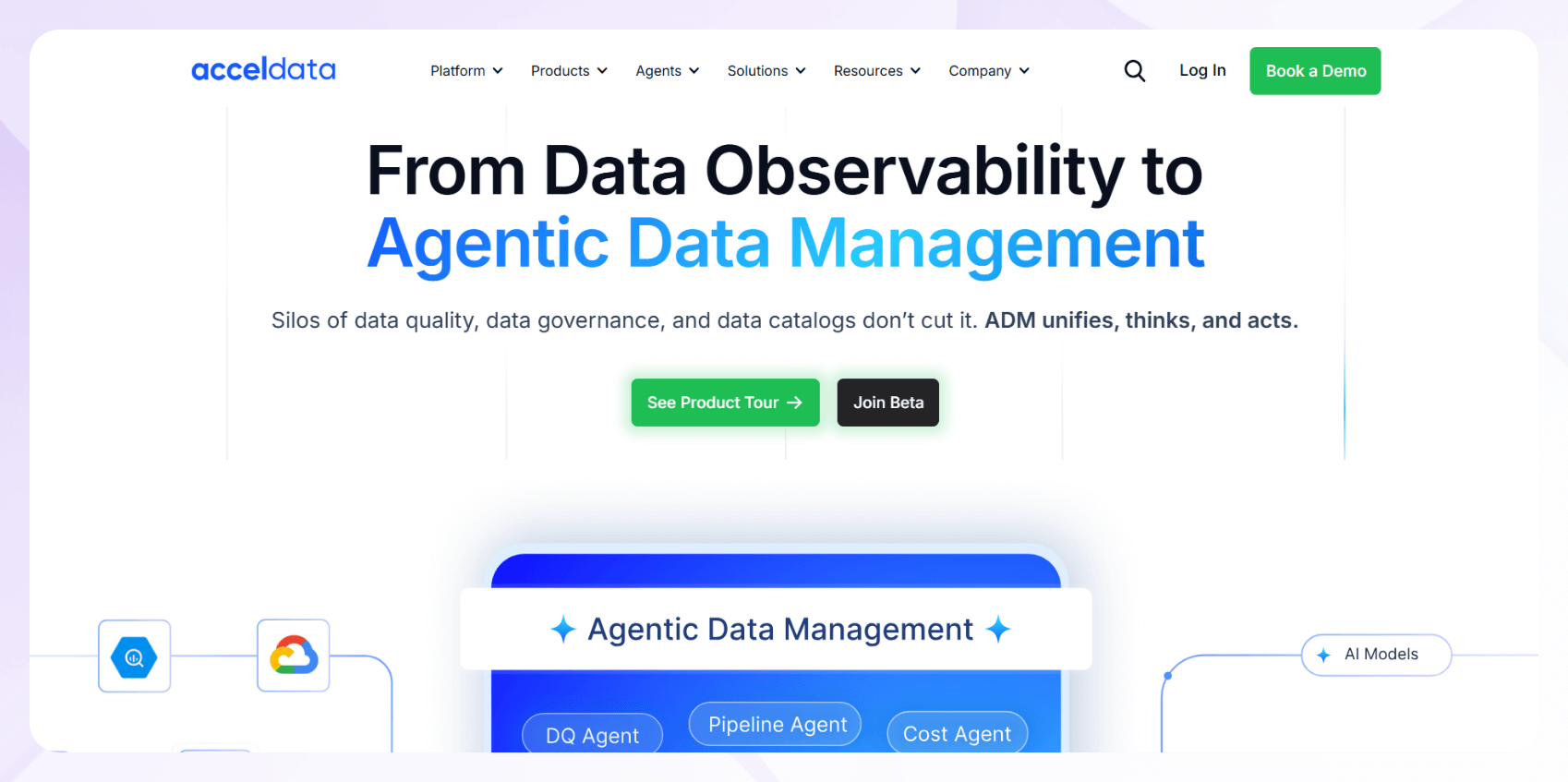
Acceldata is a data observability platform designed to monitor, analyze, and optimize data pipelines. It provides visibility across several facets related to your data quality, infrastructure health, and performance.
Who It’s for
The platform suits data-driven applications across various industries, including financial services, manufacturing, e-commerce, and SaaS. It’s geared towards large organizations and enterprises.
Key Capabilities
- Forecast with Acceldata Pulse: Use these features to monitor compute utilization, predict cost spikes, and model different scaling scenarios.
- Get full visibility into your data pipelines: Acceldata delivers observability across data ingestion, transformation, and storage. This helps data teams run smooth data operations across on-prem, hybrid, and multi-cloud environments.
- Monitor performance across infrastructure and pipelines: Track key metrics like memory usage, throughput, and latency to highlight bottlenecks and performance degradation.
Pricing
You’ll need to contact Acceldata’s sales team to get customized pricing.
Why It Matters
Acceldata transforms how businesses manage data operations by bringing end-to-end observability to every layer of the data stack. It offers a shared, up-to-the-second view of system health, performance, and data quality.
4. Appian: Best for Technical Teams
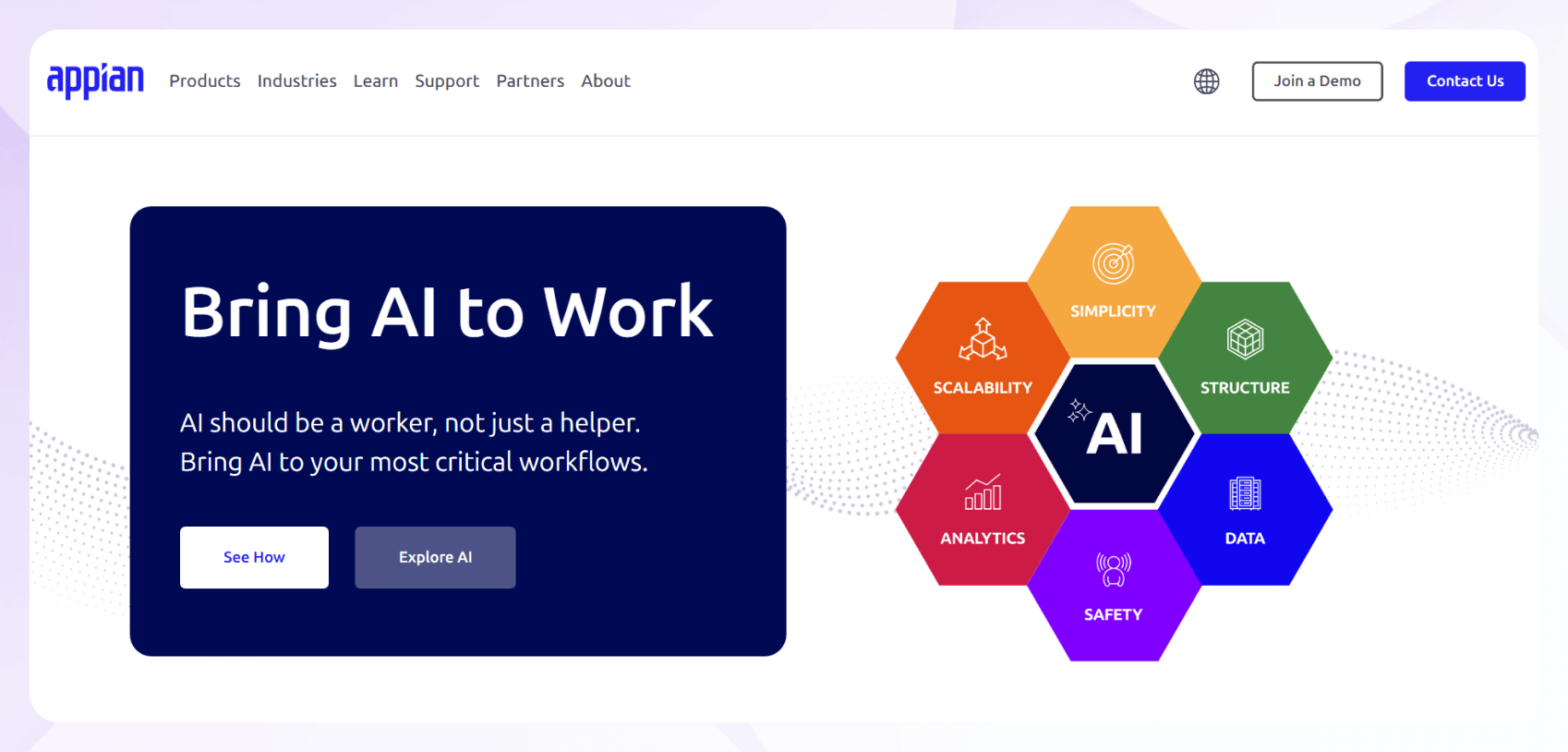
Appian lets teams design, deploy, and revise apps quickly for tasks like case handling and workflow automation. It allows teams to rapidly design, deploy, and iterate complex business applications, from case management to process automation, with minimal programming.
Who It’s for
Being a full-stack developer isn’t necessary for using Appian. But you’ll need some basic understanding of coding logic and API knowledge to successfully use the platform. Appian is optimal for teams working in finance, healthcare, government, manufacturing, and logistics.
Pricing
Appian doesn’t make its pricing plan publicly available. Contact their sales team for more information.
Key Capabilities
- Unify and sync data from multiple systems: With its data fabric approach, Appian connects to relational databases, web APIs, CRMs, and external apps. Record types and data stores sync data and build workflows based on real-time integrations.
- Low-code app builder: Appian’s Process Modeler utilizes BPMN-style (Business Process Model Notation) drag-and-drop design. This lets you define stages, branches, rules, and automations like you were using a visual flowchart to map out your business logic.
- AI and intelligent automation: Appian offers AI features like document classification, text extraction, and natural language processing.
Why It matters
Appian gives technical teams tools to manage complex workflows quickly, without heavy coding. It uses low-code tools, live data access, and automation to let you adapt and scale complex processes. The platform’s low-code accessibility requires minimal IT involvement.
Top Digital Transformation Platforms at a Glance
Why Teams Choose Blaze for Custom Transformation Projects
Teams choose Blaze for custom transformation projects because non-technical users can build secure portals, tools, and dashboards without writing code. It enables anyone to build secure portals, internal tools, and custom dashboards — all without writing a single line of code.
The platform is flexible enough to meet the needs of any company that’s ready for a digital transformation. These include a logistics company still managing deliveries in shared inboxes, or a healthcare clinic toggling between email, spreadsheets, and an antiquated EHR.
Blaze enables you to create dashboards and customer portals without coding delays or manual work. Here’s how:
- Custom workflows without developer bottlenecks: The no-code drag-and-drop interface simplifies tailoring dashboards, forms, and other tools. Anyone on your team can develop your app, so you don't need to wait for developers.
- Built-in HIPAA-compliance: Blaze comes with enterprise-grade data protection features built in. This includes audit logs, access controls, and role-based permissions. It’s also SOC 2 compliant.
- Build secure portals, dashboards, and other internal tools: Many teams still rely on emailing files and manually copying data between systems. Blaze lets you create custom-built tools, such as dashboards and client portals, on-brand. This makes Blaze a flexible digital transformation app builder for teams without developer support.
Blaze helps teams move faster, reduce wasted efforts, and leave outdated systems behind. The platform simplifies logistics workflows, organizes scattered data, and lets you build as many applications as needed.
Frequently Asked Questions
Can Blaze Replace Traditional Platforms?
Yes. Blaze replaces legacy platforms by offering a no-code solution that allows non-technical teams to build secure portals, dashboards, and internal tools. The platform makes it simple to build applications as needed. It’s ideal for businesses needing to eliminate manual workflows without hiring developers.
With integrations, automation, and enterprise-grade security, Blaze empowers teams to modernize operations faster than traditional, code-heavy platforms.
How Does Blaze Support Security and Compliance?
Blaze includes enterprise-grade security by default. It offers features like end-to-end encryption, role-based access controls, and audit logs. It supports HIPAA and SOC 2 compliance at the infrastructure level, while customers handle compliance within their workflows.
These built-in protections make it possible for businesses to create and deploy internal tools without compromising regulatory requirements or data privacy.
What Are Real-World Use Cases of Blaze?
Blaze is used by healthcare providers, logistics firms, and technology companies to build internal dashboards, client portals, and automated workflows. For example, clinics can replace spreadsheets and legacy Electronic Health Records (EHRs), while logistics teams can modernize delivery tracking from shared inboxes.
Its drag-and-drop builder enables anyone to launch secure, customized tools without needing to write code.
Build a Digital Transformation Platform Without Developers
Blaze makes digital transformation easy and effective, eliminating the need to hire a team of developers or engineering resources. Here are some of the advantages that Blaze brings:
- Works across all devices: Blaze-built apps run smoothly on mobile devices, tablets, and desktops.
- Launch time faster than traditional development: Build, test, and deploy updates quickly without waiting for lengthy developer cycles. Most healthcare teams can build and launch within 30 days.
- No-code customization: Your team can make basic updates and changes using Blaze’s drag-and-drop editor, allowing you to make changes in minutes.
- Launch support: Our implementation team assists you in launching the first version of your application.
Want to be in the driver’s seat for your platform’s digital transformation? Schedule a free demo with Blaze today.
Latest Blog & News
We love what we do and are creating a variety of resources to make you a superhero on your team! Read our articles to get inspired with what you can build with Blaze.

Healthcare Security Breaches

Is Zapier HIPAA Compliant? (No, But Here's an Alternative)
